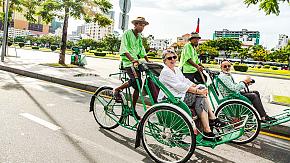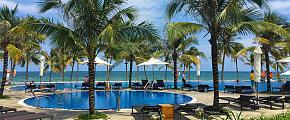Currency and Money in Vietnam 2026: Exchange Rate, Tips
How much is 1 USD in Vietnamese dong? What can 1 dollar buy you in Vietnam? Should I bring dong or USD to Vietnam? Is it better to use a card or cash? How much does a Vietnam trip cost? You may have many questions when planning your Vietnam tour. Take it easy! In this article, you will find all the answers.
- What Is the Currency in Vietnam
- Currency Rate of Vietnam Money to USD in 2026
- Best Currency to Use in Vietnam
- Change Money in Vietnam & More Tips
- Can I Withdraw Money From ATM in Vietnam
- Can I Use Cards in Vietnam
- Is It Better to Use a Card or Cash
- How Much Does a Vietnam Trip Cost
- How to Bargain in Vietnam
- Tipping in Vietnam
What Is the Currency in Vietnam
The Vietnamese Dong (VND; symbol: ₫) is the official currency of Vietnam. There seem to be a lot of denominations, and the most commonly used are: cotton banknotes of VND 1,000, VND 2,000, VND 5,000; polymer notes of VND 10,000, VND 20,000, VND 50,000; VND 100,000, VND 50,000, VND 200,000 and VND 500,000.
You may see different versions of Vietnamese Money in use nowadays. Since polymer banknote was put into use starting in 2003, now only cotton notes with a value of VND 1,000, VND 2,000, and VND 5,000 are still valid. VND 1000 has almost disappeared because it cannot buy anything.
Currency Rate of Vietnam Money to USD in 2026
How much is $1 in Vietnamese dong? 1 US Dollar exchanges 26,371 Vietnam Dong (November 13, 2025). You may feel confused about how to calculate the rate from money of Vietnam to the US Dollar. Check the table below to make it clear.
| Material of Banknotes | Value of Vietnam Dong | ≈ Value of US Dollar (November 13, 2025 Updated) |
| Cotton | 1000 | 0.038 |
| 2000 | 0.076 | |
| 5000 | 0.19 | |
| Polymer | 10,000 | 0.38 |
| 20,000 | 0.76 | |
| 50,000 | 1.90 | |
| 200,000 | 7.59 | |
| 500,000 | 18.98 |
Best Currency to Use in Vietnam
Should I bring dong or USD to Vietnam? Vietnamese Dong is the best currency to use with no doubts. Most payments are made in Vietnamese Dong, but US dollars can be directly used for some hotels, restaurants, tours, or other services. You may see the prices for food, drinks, and souvenirs in Ho Chi Minh City's airport are all in US dollars. However, it is not recommended to pay with US dollars instead of Vietnam money, because they will be converted at a lower exchange rate and you will end up paying more.
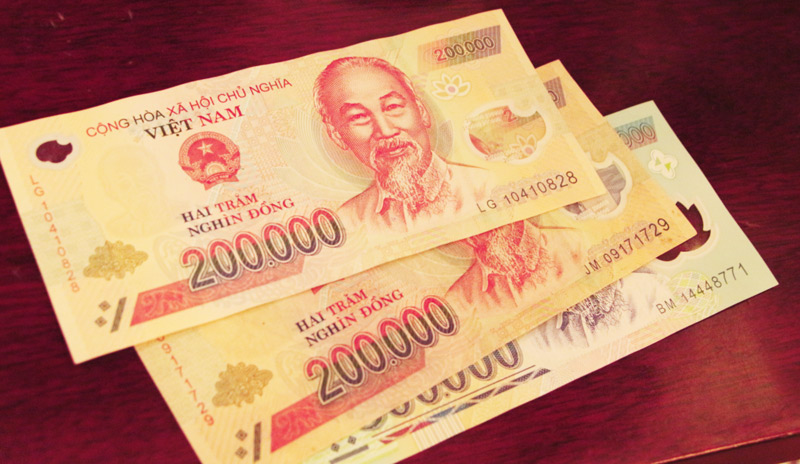 Vietnamese Dong
Vietnamese Dong
Change Money in Vietnam & More Tips
Most major currencies can be changed in Vietnam. US Dollars to Vietnam money can easily be changed in banks, hotels, airport currency exchange stalls, and jewelry shops. Other currencies, including Euros, AUD, and UK Pounds, can be changed in banks.
Banks
You can change foreign currency (such as US dollar or Euro) and checks at the safest place - banks such as Eximbank, Vietcombank, Vietinbank, Agribank, etc., around the city. But it's a slow process, and you'll be charged a commission rate of between 0.5% to 2%. And if your notes are dirty or damaged, you will be charged an additional 2% of the note's value.
Hotels
You can get a more competitive rate between Vietnam money to US dollar or Euro by changing your currency in large hotels, nearly equal to the bank. And small hotels may charge a service fee.
Airports
You will find some currency exchange stalls when arriving at the airports of Hanoi and Ho Chi Minh City. However, the exchange rate is unfavorable here. Therefore, it's best to change a small sum to cover your taxi fare and head to town for a better rate.
Gold and Jewelry Shops
You can go to the gold and jewelry stores, usually in red and gold colors, on every main street for better deals, where you can change the VND with no fees. It should be noted that the exchange rate may be different from the official one in the bank. Including the USD denominations, the rate for a large bill will be higher.
You can check the rate using currency converter tools online, and ask around to choose the best deal. In the past one year, the exchange rate of the Vietnam Money to the US Dollar is between VND 23,470 to 25,455.
More Tips for Changing and Using Money in Vietnam
1. According to the law, amounts exceeding VND 15,000,000 must be declared on arrival, and amounts exceeding USD 5,000 or equivalent in other currencies must be declared as well.
2. Don't change money on the black market, as it is probably just the lead-up to a scam.
3. Don't change too much money at one time, or you will need a suitcase to carry your Vietnamese Dong around.
4. Don't accept any damaged notes from others, as it will be hard for you to use them again.
5. Check the polymer material, hidden image element, and embossing to ensure you receive genuine notes.
6. The new polymer notes easily stick to each other, so count your money carefully and try not to pay more money than you need.
Can I Withdraw Money From ATM in Vietnam
ATMs are available in major cities and tourist areas of Vietnam, but chip-and-pin ATMs are not easy to find. Therefore, it's best to bring a card with a magnetic stripe on the back. ATMs only dispense VDN. When you withdraw from ATMs, all foreign currencies will be automatically changed to VND based on the bank rate at that time.
ATMs have limits. Generally, the maximum amount is from VND 2,000,000 to 5,000,000, VND 8,000,000 to 10,000,000 for a few global banks, or up to VND 2,000,000 in rural districts. Charging fees also vary from bank to bank. Most banks charge from VND 40,000 to 100,000 (USD 1.7-4) each time. ANZ or Citibank are recommended as they charge the lowest transaction fee.
It's best to use the ATM connected to the bank and keep cautious about anything or anyone suspicious nearby. Always check the card slot before you insert your cards.
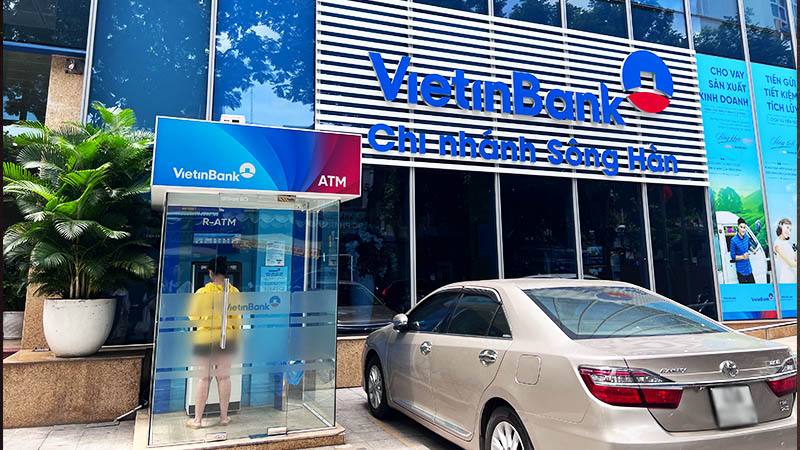 Vietnam Bank & ATM
Vietnam Bank & ATM
Can I Use Cards in Vietnam
Debit and credit cards like Visa and MasterCard are widely accepted in Vietnam, especially in hotels or shopping malls, but probably not suitable for roadside stalls or noodle houses. You may be charged a 3%-4% commission if paying with plastic.
Is It Better to Use a Card or Cash
In Vietnam, both cash and credit cards have their advantages and disadvantages:
Cash: Cash is still the primary payment method in many small shops, markets, and restaurants, especially in rural areas. It's also useful to avoid credit card transaction fees. You may carry cash in various denominations, so make sure your wallet is large enough and be mindful of safety. Carrying cash also means you need to use a calculator frequently if you are not very good at math. Local people often ignore the last three zeros when giving a price. For example, if they want to quote VND 50,000, they will say 'fifty' instead of 'fifty thousand'.
Credit Cards: In major cities and tourist hotspots, many hotels, restaurants, and shops accept credit cards, making payments convenient and secure. However, some places may charge additional fees for card transactions. Besides, small shops and local markets may not accept credit cards.
Overall, it's advisable to carry some cash for small purchases while using credit cards in larger cities is also a good option. In advance, it would be better to inform your bank about your travel plans to avoid any issues with your card.
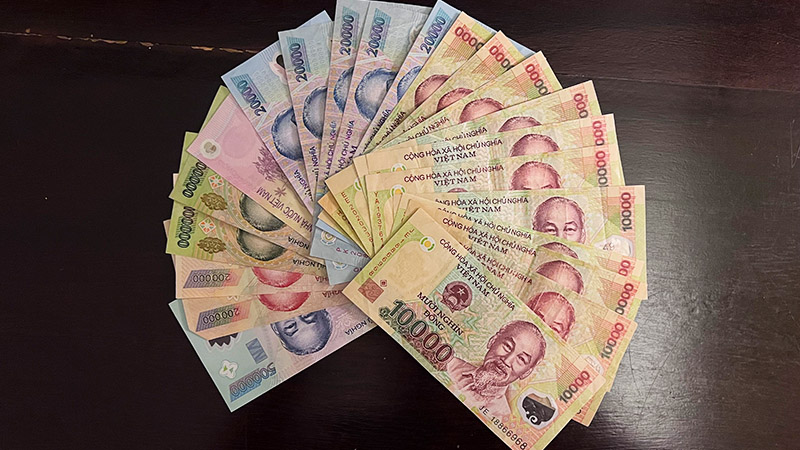 Vietnam Money
Vietnam Money
How Much Does A Vietnam Trip Cost
For an Odynovo private tour including your tour guide, transportation, accommodation, and some other activities, the price starts from 140 US Dollars per person per day. Due to different types of travel styles and length of your vacation, the cost of a Vietnam tour may vary. We provide some information to help you know the price of your vacation in Vietnam more clearly.
Hotels
Usually, 5-star hotels range from USD 80-200 (approximately VND 200,000-5,000,000) per night, and 4-star hotels from USD 50-100 (approximately VND 1,300,000-2,500,000) per night. For a comfortable night in a 3-star hotel is about USD 30-60 (approximately VND 760,000-1,520,000). If you want a different night, there are also luxury rooms for about USD 200-400 (approximately VND 5,000,000-10,000,000) per night or above to enjoy a night on a private cruise ship across Halong Bay or a villa with pools and spas right on the beach.
Transportation
Domestic airfare for round trips should be not more than USD 150 (approximately VND 3,800,000) within the country if you book in advance. Train fares are USD 5-60 (approximately VND 130,000-1,520,000), while bus fares are a little lower at USD 1.5-50 (approximately VND 38,000-1,300,000) depending on the class and distance. The average price of a taxi is USD 0.4-0.48 (approximately VND 10,000-12,000) per km.
Food
You can have lunch or dinner at USD 8-15 (approximate VND 204,000-382,000) per person and USD 3-4 (approximate VND 76,000-102,000) for breakfast. For common Vietnamese dishes, the price may be as low as USD 1-5 (approximate VND 25,000-127,000) per dish.
Tour Activities
Expect to pay USD 20-40 (approximately VND 500,000-1,000,000) for a day trip in Vietnam, including shuttle service. And the price is about USD 120-200 (approximately VND 3,000,000-5,000,000) for a 2D1N Halong Bay Cruise.
Therefore, if you want to have a more comfortable holiday, you need to prepare USD 50-100 (approximately VND 1,300,000-2,500,000) per day. If you like to wake up in a luxury hotel, it's easy to find 5-star hotels to match a budget of more than USD 200 (approximately VND 5,000,000) a day.
How to Bargain in Vietnam
Bargaining can be fun and is very common in Vietnam, just as in other Southeast Asian countries. When you buy souvenirs at Ben Thanh Market of Ho Chi Minh City, you may be overcharged because locals think that foreign tourists are all rich. So, you can bargain hard, but you should be respectful and polite to the sellers. When you pay in Vietnam, discounts of 50% or more are possible. If you are not sure about the price, shop around to find the market price, as many shops sell the same goods.
Tipping in Vietnam
Tipping is not expected in Vietnam, but it's much appreciated.
Hotels
You can give the cleaning staff and porter a small gratuity if you like. But a 5%~10% service fee may have been added to your bill in large hotels.
Restaurants
Locals don't tip. A 5% ~ 10 % service fee may be charged on your bill.
Guides and Drivers
A tip of a few dollars per day is reasonable if you think they have really done a good job of making your trip memorable.
Plan Your Vietnam Tour With Experts
If you have any questions about the currency or want to get some professional travel tips about Vietnam, feel free to contact our team to obtain more suggestions. You can also choose one of our tailor-made tours and travel around Vietnam with our local guides.
Related Posts You May Like
What Our Clients Say
Explore the latest verified reviews of Odynovo's travel services on Tripadvisor, Google, Trustpilot, Product Review and more trusted platforms.










